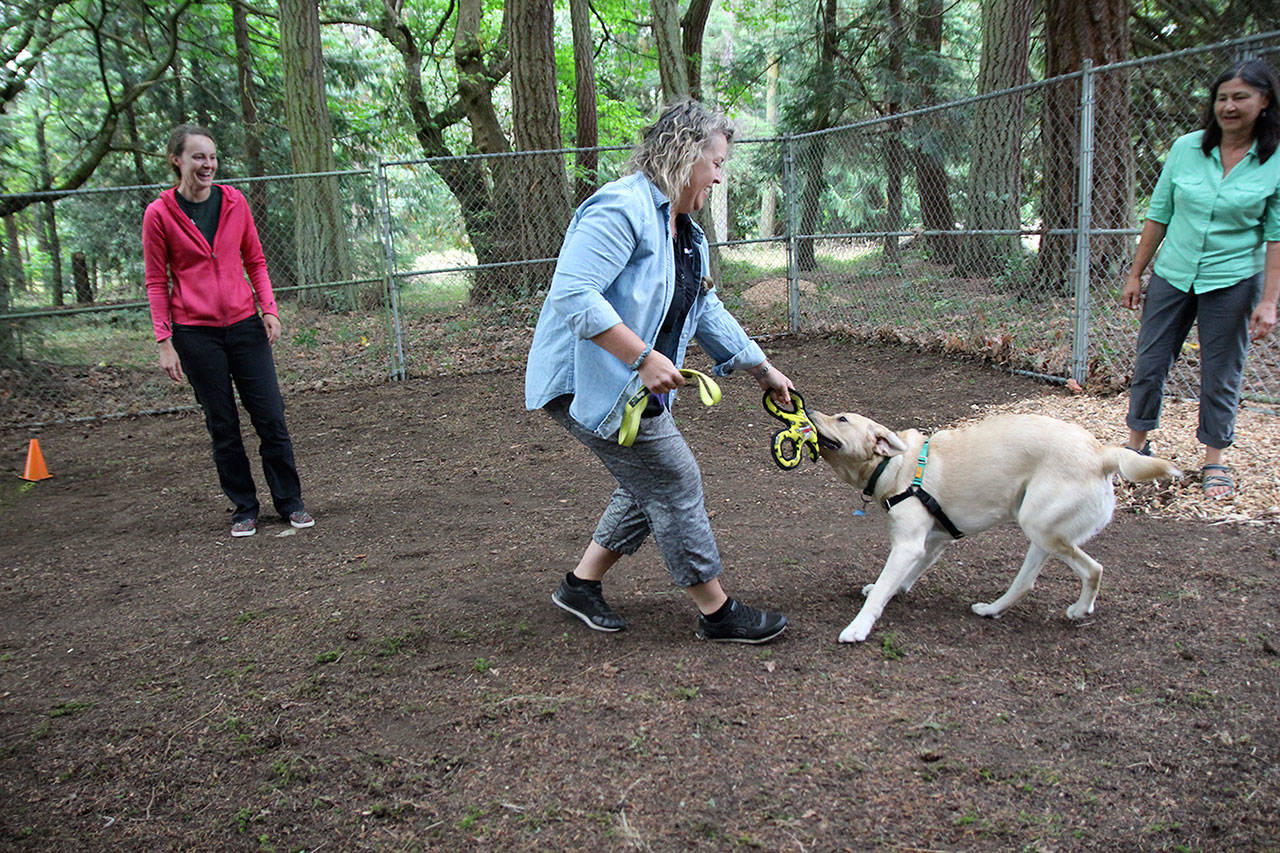With tails wagging and ears perked, eager canine “athletes” dashed and demonstrated their skills at the Doggie Olympics during the Summit Assistance Dogs’ annual volunteer appreciation picnic on North Whidbey last Saturday.
The obstacle courses were designed not to show off entertaining tricks, but to put the four-legged students’ prowess as service animals-in-training to the test.
The mix of mostly Labradors and golden retrievers competed for gold, silver and bronze awards and were scored by staff on their performances. A few events were just for fun, such as the paddleboard test, where the dogs balanced on the raft and stayed out of the way of the shifting paddles.
The first game of the day was the timed “Puppy Olympics Kennel Run.” Volunteer puppy raisers tested their dogs’ responses to kennel cues and patience before grabbing a toy. If the dogs successfully and quickly completed their tasks, they stood in the running for top spot. Kathleen Cole of Kitsap and her dog Maggie won top prize with 26.61 seconds of smooth pacing.
Part of the point was to teach the dogs to enjoy going in the kennel, trainer Lindy Langum said of the event. It’s all part of being a well-behaved mobility assistance dog.
The young pups with Summit Assistance Dogs that progress in the their training will eventually be placed with clients with disabilities affecting mobility after the application process is complete.
Brianna Vail, who attended the picnic with her Summit-graduated dog, said one of the most useful tasks Mabel does is pick up dropped items.
“We’re in the business because it’s such a huge need,” Summit spokesperson Alice Collingwood said.
The organization provides dogs mainly throughout Western Washington, she said, but also as far as Eastern Washington and Oregon. Staff members prefer placing dogs within 200 miles, because of the time commitment required by clients.
The nonprofit, founded in 2000, has placed over 85 assistance dogs with people with disabilities. Summit dogs can do a wide range of tasks, including opening and closing doors, turning on and off lights, getting the phone and providing emotional support.
The annual “thank you” picnic was held at the roughly 17-acre Summit-owned property on East Henni Road, bringing together staff and volunteer puppy raisers who typically care for the dogs from 8 weeks to 1 year of age. The full training process takes about two years.
Summit Assistance Dogs has about 35 people on its waiting list to receive an assistance dog, Collingwood said.
It’s been many years in the making, but staff members have high hopes for a permanent facility for the organization, which currently has an Anacortes mailing address and operates out of people’s homes.
At the Henni Road property, bought in 2014 after the $80,000 sale of a donated North Whidbey property, Summit Assistance Dogs is working to construct three buildings — a kennel, training/administrative building, and dormitory for clients to stay short-term while they’re paired with an assistance dogs for the training.
“We looked for a long time,” Collingwood said of the search for a site to build the facilities. “When this place became available, it was like a godsend. … The day we open the door is going to be pretty exciting.”
But the puppy raisers needn’t worry — they’ll still be needed, she said. The operation will just be bigger and broader if plans succeed. So far, the group has received permits and site preparation groundwork laid out, though the three-phase project will likely take years to complete, as it will rely on donations and fundraising campaigns. Construction of a canine condo is next on the list.
As of September, the organization has $2,011,000 in donations and pledges toward the first phase goal of $2.5 million, Collingwood said. Organizers estimate a need of about $5 million to complete the full campus.



